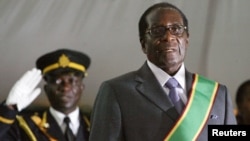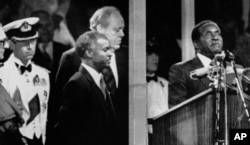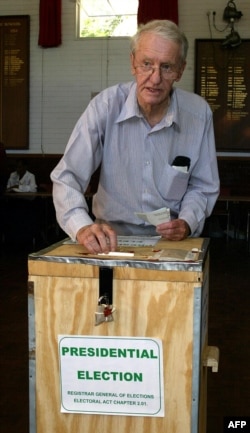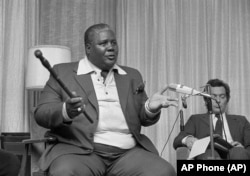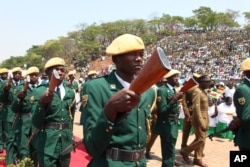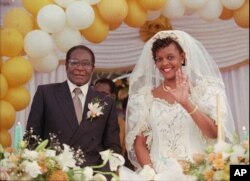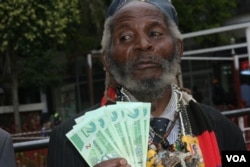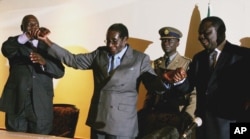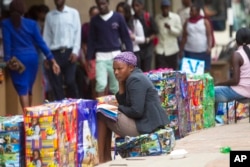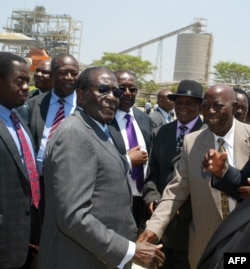President Robert Mugabe was born at Kutama Mission in the Zvimba communal lands, Mashonaland West province, on February 21st, 1924.
He is one of five children of Bona and Gabriel Mugabe Matibiri of Malawian origin. Others were Michael, Raphael, Donato, Sabina and Bridgette. His father had three children - Regina, Albert and David - after he settled for a second wife in the 1930s in Bulawayo where he persued his career in carpentry.
One of his homeboys, James Robert Dambaza Chikerema, who attended school and herded cattle with Mugabe, once described him as an aloof and withdrawn person.
Chikerema, who was a founding member of the City Youth League clamouring for universal suffrage in the then Rhodesian capital – Salisbury - and played a key role in the formation of the Southern Rhodesian African National Congress, claimed that Mugabe was a temperamental lad that wanted to win all the time. He said the former Zimbabwean leader would simply drive his cattle from local herds if he was upset and then spend the whole day alone.
Mugabe attended a local Jesuit school where he excelled and was encouraged by one of the priests to further his education. His father abandoned the family when he was aged 21 and his mother, a teacher, had to fend for his family while the late Mugabe helped out by tending the family’s cattle and doing odd jobs.
BITTER UPBRINGING
He once wrote a scathing letter to his father admonishing him for abandoning them but was forced to apologize by his uncles and other relatives.
Mugabe started his tertiary education at Fort Hare University in the Eastern Cape, graduating in 1951 with a Bachelor of Arts degree in History and English. He taught at several schools, including Hope Fountain Mission near Bulawayo in Matabeleland, where he was affectionately known as Ngwenya.
In 1955, Mugabe moved to the then Northern Rhodesia where he taught for about four years at Chalimbana Training College. During that teaching stint, he obtained a Bachelor of Science Degree in Economics, through correspondence. Three years later, Mugabe moved to Ghana where he taught at St. Mary's Teacher Training College. That is where he met his first wife, Sarah Heyfron, who died of cancer in 1992. He married her in 1961 after completing his Economics Degree. Their son, Michael Nhamodzenyika, died at the age of three in Ghana and Mugabe, who was imprisoned, was not allowed to attend his funeral.
MARXIST POLITICAL ORIENTATION
Fired up by the Marxist and Pan-Africanist politics in Ghana, the Mugabe visited home in 1960 where he became involved in the nationalist movement fighting against laws such as the Land Husbandry Act and others they oppressed blacks in Rhodesia. His visit home coincided with nationwide protests in African townships where people were demanding better living conditions, equal rights and majority rule. He agreed to address a crowd at a township hall protesting the arrest of their leaders. Mugabe informed them about how Ghana had successfully achieved independence through Marxism.
A few weeks later, he was elected as the publicity secretary of the National Democratic Party, which was banned in 1961 by the Rhodesian government resulting in the formation of the Zimbabwe African People’s Union (Zapu) under the leadership of trade unionist, Joshua Mqabuko Nyongolo Nkomo, who was the president of the banned African National Congress and National Democratic Party. However, Mugabe and his colleagues became frustrated by the slow pace of an armed liberation struggle against the colonial regime of Ian Douglas Smith.
ZANU REBEL
In 1963, he teamed up with other nationalist in Tanzania and formed a Zapu faction, which was named the Zimbabwe African National Union (Zanu) under the leadership of Reverand Ndabaningi Sithole. A year later, Mugabe was arrested and locked up for almost a decade at Hwahwa Prison, Sikombela Detention Center and Salisbury Prison. It was during that time that he did various correspondent courses and spearheaded the fall of Ndabaningi Sithole in 1974, who was accused of being a counter revolutionary.
Still unnerved by the black nationalist movement, Smith declared that a black person will never rule the country.
“I don’t believe in black majority rule ever in Rhodesia. Not in a thousand years!”
But Mugabe had other plans as he left the country for Mozambique in 1974 when Smith allowed him to attend a meeting in Tanzania. In the thick bushes of Mozambique, he spearheaded the formation of the Zimbabwe National Liberation Army (ZANLA), an armed wing of the Zimbabwe National Union, which over the years conducted a guerilla war against the Smith government until independence talks in 1979. Mugabe and Nkomo were involved in the negotiations as the Patriotic Front at Lancaster House in London. British representative overseeing the political transition in Rhodesia had this to say during the talks.
“In opening this conference, I express the hope that we will be able to lay the foundations for a free, independent and democratic society in which all the people of Rhodesia, irrespective of their race or political beliefs, will be able to live in security and peace, with each other and their neighbors.”
LANCASTER HOUSE CONSTITUTION
Mugabe and Nkomo settled for the adoption of the Lancaster House Constitution, which resulted in the holding of elections in Zimbabwe Rhodesia then under the leadership of Smith and Bishop Abel Tendekai Muzorewa. Mugabe and his associates dumped the Patriotic Front and contested the elections under ZANU. Joshua Nkomo wrote in his book, ‘The Story of My Life’ how Mugabe took everyone by surprise with his sudden departure after the signing ceremony and the announcement that ZANU would be contesting the first elections separately. Mugabe won those elections to form the first majority government of the Republic of Zimbabwe in 1980.
His party won 57 seats followed by the Patrotic Front led by Nkomo with 20 seats and Muzorewa of the United African National Council three seats. Twenty seats were reserved for Smith’s Rhodesian Front. Mugabe was the first black African leader of independent Zimbabwe. He was sworn in on April 18, 1980, at Rufaro Stadium in Harare.
“I, Robert Gabriel Mugabe do swear that I will well and truly serve Zimbabwe; so help me God.”
GUKURAHUNDI ATROCITIES
A few months after independence, a firefight broke out between Mugabe’s ZANLA forces and members of Nkomo’s armed wing, the Zimbabwe African People’s Army – ZIPRA – at a township in Zimbabwe’s second largest city, Bulawayo, where the combatants were awaiting demobilization after decades of war.
The running battles ceased for a while before escalating into a larger conflict, which became known as Entumbane Battles. Some people lost their lives in the conflict that nearly degenerated into a civil war. A few years later, Mugabe sacked all ZAPU cabinet ministers following allegations that Nkomo was allegedly attempting to topple the government. A campaign of terror was launched by then Prime Minister Mugabe on Nkomo and his followers in what the Zimbabwean authorities code-named Gukurahundi or the early rain which washes away the chaff before the spring rains.
The North-Korean trained Fifth Brigade allegedly killed more than 20,000 people in Nkomo’s strongholds – Matabeleland and Midlands provinces. Mugabe once described the atrocities as a moment of madness though he did not openly apologize to affected families.
He resigned without resolving the issue that is still fresh in the minds of many people in the country. In an attempt to fix the internal rift between PF Zapu and Zanu PF, Mugabe and Nkomo signed a unity accord in 1987, which resulted in a merger of the two parties.
EXECUTIVE PRESIDENT
Mugabe became an executive president while Nkomo deputized him together with the late Simon Muzenda, drawn from his party. However, some disgruntled Zapu cadres, including Russian-trained former ZIPRA intelligene supremo, Dumiso Dabengwa, decided to abandon the agreement after the death of Nkomo, saying Mugabe was only catering for the needs of his old Zanu PF colleagues. Nkomo, who once fled from the Fifth Brigade or Gukurahundi, and went to London to seek refuge after Mugabe accused him of attempting to topple him, was bitter about the way Zimbabwe was being run.
He said, “I have worked so hard for this country … Before independence …. During the war, I worked so hard after independence to make our independence stick.”
Between 1987 and 2017, Mugabe’s party won all the elections though the ruling party was almost defeated by former trade unionist Morgan Tsvangirai’s Movement for Democratic Change formed in 1999. Tsvangirai beat Mugabe in the 2008 presidential election but could not reach the threshold of forming a government. His party has a parliamentary majority before losing it in the 2013 general elections, which opposition parties claimed were rigged in favour of the ruling party.
LOVE AFFAIR
In social circles, Mugabe had an affair with his then secretary, Grace Marufu, who was married to wing commander Stanely Goreraza. Being a devout catholic, Mugabe’s infidelity was problematic on religious grounds until the late Archbishop Patrick Chakaipa, Zimbabwe's first black catholic archbishop, agreed to officiate at the wedding. By 1991 the two had two children, Bona and Robert Junior. A few years later they had another son, Bellarmine Chatunga.
Apart from that, he is well-known for deriding his opponents. He once described his bitter rival Joshua Nkomo as acting like a snake in the grass, which needed to be crushed. And he had a mouthful for Tsvangirai, whom he described as a cassanova, merely dreaming of becoming a president after eating a lot of roundnuts, well-known for producing too much gas in human beings.
Mugabe, a staunch Maoist, experimented with several economic programs, including the Structural Adjustment Program funded by the International Monetary Fund and related institutions, in an effort to save the country’s declining economy owing to its involvement in the late 1990s in a civil war in the Democratic Republic of Congo. This was worsened by his government’s move to pay each war veteran a gratuity of $50,000 after neglecting them for 17 years. According to independent economists, Zimbabwe’s serious economic problems started after these payouts. There was already some discontent over rising price increases and unemployment and attempts by Mugabe’s party to create a one-party state.
ECONOMIC MELTDOWN
The country had also recorded some corrupt activities associated with senior government officials, members of the armed forces and Mugabe’s close associates. One of them was the so-called Willowgate Scandal, which was revealed by the Bulawayo-based state-controlled newspaper, The Chronicle in 1988. Some cabinet ministers, business executives and others were abusing a state-sanctioned facility in which government officials had access to cheap vehicles at Willowvale Motor Industries.
Instead of buying vehicles for their own use, the cabinet ministers purchased several vehicles each and sold them to members of the public at inflated prices. Mugabe set up a commission of inquiry but no-one was locked up. The scandal was followed by a payout scheme in which war veterans siphoned millions of dollars from the War Victims Compensation Fund. Some of Mugabe’s top officials were caught up in the scam as they made outrageous war injuries.
By the late 1990s, Zimbabwe’s economy had deteriorated fast and Mugabe pulled the country out of the Commonwealth, a grouping of former British colonies while he was slow turning his back away from creditors like the IMF, World Bank and others, claiming that the Structural Adjustment program was ruining his nation. Realizing that the country was plunging into a political and economic crisis, a cross-section of civic society groups, students and workers’ unions teamed up September 1999 under the auspices of the National Constitutional Assembly to form the Movement for Democratic Change or MDC party, led by Tsvangirai.
CONSTITUTIONAL REFERENDUM
A year after the formation of the party, Zimbabwe conducted a constitutional referendum that was rejected by the electorate suspecting that Mugabe was trying to entrench his rule.
In retaliation, Mugabe encouraged his supporters to invade white-owned commercial farms. Some of the farmers were butchered by marauding war veterans, Zanu PF youth and sympathizers.
Mugabe’s party was in 2000 humiliated by Tsvangirai’s MDC though Zanu PF retained control of the government through some constitutional provisions allowing him to appoint additional lawmakers. A bloody presidential election re-run eight years later after being defeated by Tsvangirai in the initial poll, left over 200 Zimbabweans dead and hundreds maimed or displaced.
The West accused Zanu PF of carrying out an orgy of violence to ensure Mugabe won the election re-run. The European Union, America and several other nations slapped Mugabe and his inner circle with targeted sanctions claimed that he had rigged elections and violated people’s fundamental rights.
UNPRECEDENTED ECONOMIC CRISIS
Between 2002 and 2008 Zimbabwe plunged into an unprecedented economic crisis as it recorded historic hyperinflation and failed to service its debts. In an effort to contain hyperinflation, the country printed what were known as bearers’ cheques, which became some form of currency due to a crippling shortage of foreign currency.
Mugabe’s government subsequently raided bank accounts of several non-governmental organizations and seized millions of dollars in foreign currency. Some of the money had not yet been paid back by the government at the time of his death.
Realizing that Zimbabwe was facing serious problems, the Southern African Development Community or SADC asked the South African president Thabo Mbeki to craft an internal settlement between Mugabe’s Zanu PF party and Movement for Democratic Change formations led by Tsvangirai and Arthur Mutambara.
TREASON CHARGES
During that time Mugabe accused Tsvangirai, like his previous political rivals – Nkomo, Ndabaningi Sithole of Zanu Ndonga - of attempting to remove him from power through unconstitutional means. Tsvangirai was dragged to court but treason charges against him were dropped in 2004. In 2009, the three parties set up a unity government, which saw remarkable growth in various sectors.
Zimbabwe’s Gross Domestic Product recorded a 10,6 percent growth and hyperinflation deceased substantially and the country started engaging the West though the latter maintained sanctions against Mugabe and his inner circle. The former president bemoaned the imposition of sanctions against his government, claiming that they were hurting ordinary people.
Mugabe managed to retain power in the unity government as he was in charge of security forces, which were always critical in maintaining his rule.
TWO MILLION JOBS
The unity government ended in 2013 after Zanu PF won overwhelmingly in most parts of the country in a poll described by the opposition as widely rigged in favour of the ruling party. Although Mugabe’s party promised to create over 2 million jobs in the run up to the poll, indications are that a large number of companies shut down soon after the elections due to lack of capital and related issues. The economy, once again, tanked resulting in Zimbabwe printing what are called bond notes. Initially government officials and the central bank claimed that the bond notes were designed to boost exports but they were used as some form of official currency. Widespread shortages of the bond notes and the United States dollar in major banks almost crippled the economy under Mugabe’s watch.
Some people have commended Mugabe for the high literacy rate in Zimbabwe and establishment of the Presidential Scholarship Fund, a facility for intellectually-talented Zimbabweans with financial problems to access tertiary education. Others praise him for parceling out land to some Zimbabweans, mostly war veterans of the 1970s and Zanu PF supporters. In military circles, Mugabe is respected for providing security forces for international mission sanctioned by the United Nations.
But he will be widely remembered for his tight grip on power and vowing that Zimbabwe will not be run again by colonialists.
For him, “There will never be a regime change here. There will always be the people of Zimbabwe, in control.”




